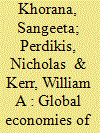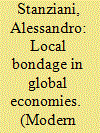| Srl | Item |
| 1 |
ID:
137813


|
|
|
|
|
| Summary/Abstract |
Economies of scale are an alternative source of growth particularly at a time when countries are suffering from global economic malaise. The proposed EU-India free trade agreement holds substantial promise as this will create a combined market of over one and a half billion and generate economies of scale from intra-industry trade, which are likely to be concentrated in manufactured products such as chemicals, machinery and transport equipment. Bold action is needed on the part of politicians in both the EU and India to successfully negotiate the agreement given that this will enable both countries to reap the efficiency gains of global economies of scale, provide a significant competitive advantage over other major economies and deliver the necessary spur to shake both the EU and India out of their current economic stagnation.
|
|
|
|
|
|
|
|
|
|
|
|
|
|
|
|
| 2 |
ID:
121981


|
|
|
|
|
| Publication |
2013.
|
| Summary/Abstract |
This paper compares the definitions, practices, and legal constraints on labour in Britain, France, Mauritius, and Reunion Island in the eighteenth and nineteenth centuries. It argues that the way in which indentured labour was defined and practised in the colonies was linked to the definition and practice of wage labour in Europe and that their development was interconnected. The types of bondage that existed in the colonies were extreme forms of the notion, practices, and rules of labour in Europe. It would have been impossible to develop the indenture contract in the British and French empires if wage earners in Britain and France had not been servants. The conceptions and practices of labour in Europe and its main colonies influenced each other and were part of a global dynamic.
|
|
|
|
|
|
|
|
|
|
|
|
|
|
|
|
| 3 |
ID:
127293


|
|
|
|
|
| Publication |
2014.
|
| Summary/Abstract |
This paper describes and analyses the multi-actor governance process that made Mozambique the first African nation-state to develop a national policy framework for sustainable biofuels. The paper draws on findings from action research conducted in Mozambique between December 2008 and July 2012. We analyse interactions between the changing governance context, the course of the multi-actor governance process, and the choices in relation to governance framework characteristics and content for four successive stages of governance framework development. This provides the basis for reflection on the competences required for effective multi-actor sustainability governance, and a discussion about the role of the nation-state in sustainability governance of global economies such as biofuels.
The governance framework for sustainable biofuels has contributed to a more transparent and secure investment climate for biofuels in Mozambique. Key factors for success were (1) the presence of different types of competences during the various stages of the governance framework development, (2) closing the gap between 'licences to sell' and 'licences to produce' across different governance levels, and (3) balancing between the short- and long-term objectives for biofuel production in Mozambique and requirements of global biofuel markets. Developing-country nation-states can provide an essential contribution to these success-factors for global governance of sustainable biofuels.
|
|
|
|
|
|
|
|
|
|
|
|
|
|
|
|